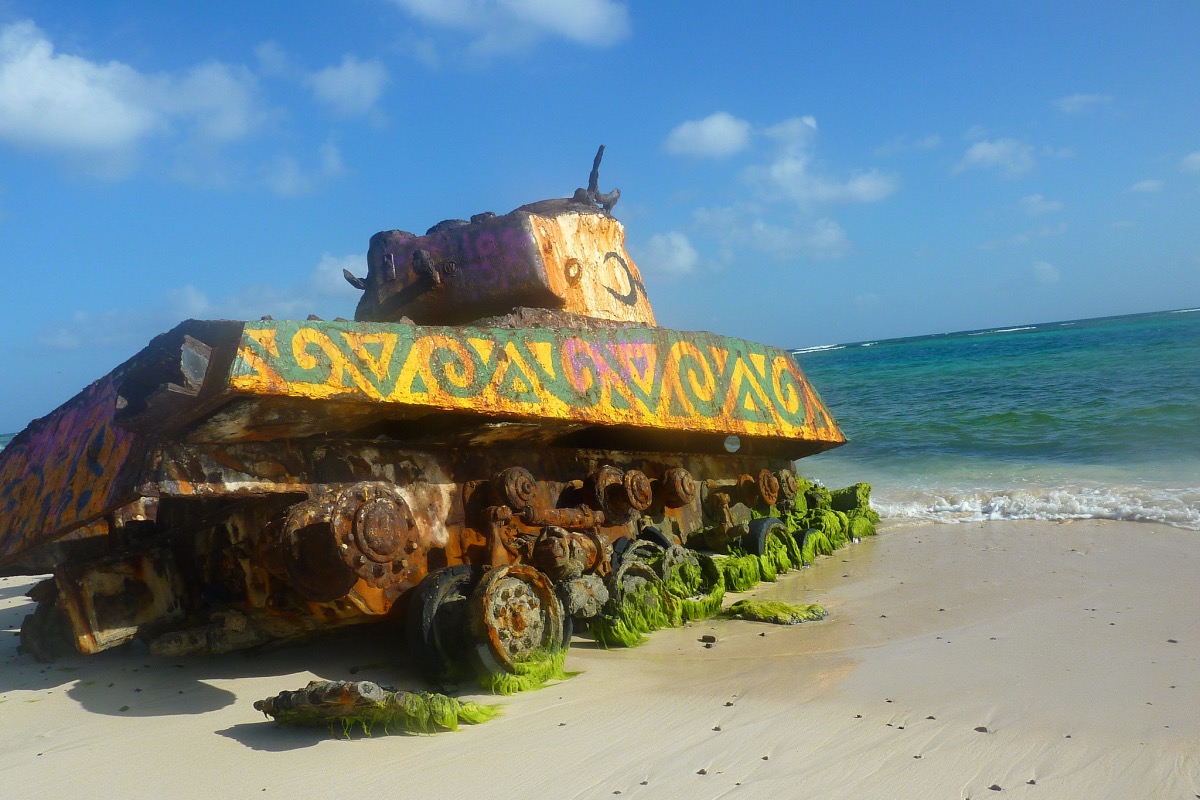

Rusting graffiti-covered tanks litter world-famous Flamenco Beach on the island of Culebra, once used by the U.S. military for target practice. (Jirka Matousek/CC BY 2.0)
CULEBRA, Puerto Rico — The island town of Culebra, part of the Puerto Rican archipelago, has always been a magnet for outside interests. In 1867, the United States tried to buy it from Spain—that didn’t work out. But then the U.S. invaded Puerto Rico in 1898, and within a few years, the U.S. Navy was training in Culebra.
The constant bombing disrupted the lives of culebrenses as they tried to carry on with their daily activities, from attending school to going to church. People were forced out of their homes to make space for the military, and there were accidents that threatened the lives of the locals.
By the 1970s, culebrenses were tired and “Navy Go Home” graffiti started showing up on the streets. The people of Culebra organized, marched, and committed civil disobedience. Their mayor, Ramón Feliciano “Monchín,” also found a lawyer willing to sue the U.S. Navy. They succeeded, and in 1975, the Navy left Culebra.
But almost four decades later, culebrenses face a new threat: overdevelopment.
Culebra is only seven miles long and two miles wide. Whatever happens on land has an almost direct impact on the marine ecosystem. The island is surrounded by critical habitats of endangered species of turtles and corals. Sediment runoff, as a result of deforestation and overdevelopment, is threatening the delicate ecosystems of Culebra, according to marine biology experts.
“The island of Culebra is one of the places that still supports one of the best-developed reefs in Puerto Rico. That’s how serious the situation is on the big island,” says Edwin Hernádez Delgado, a marine biologist who has been studying Culebra for over 30 years. “In other words, we have diversity and underwater landscapes that I still consider epic. We are trying to kill the goose that lays the golden eggs if we continue with a pattern of development that is unsustainable.”
There’s one particular tool that is being used in Puerto Rico to fast-track development. It’s called “categorical exclusion,” and it allows proponents to skip having to do a detailed evaluation of their project’s environmental impact.
It’s the same mechanism that was used to fast-track the construction of a pool in Rincón, which led to protests and confrontations. The Puerto Rico Planning Board eventually determined the permit for the pool had been issued illegally.
Through a FOIA request, we were able to get data from the Permit Management Office (OGPe, in Spanish) of categorical exclusions approved in Culebra. This data was analyzed by environmental planner Alfredo Montañez Acuña, who found that at least 30 categorical exclusions approved in Culebra in the last eight years are potentially illegal.
Just like the case in Rincón, they appear to have been approved in environmentally delicate areas, where a detailed evaluation should not be skipped, according to the government’s own rules.
“We could expect reef collapse if we continue as we are,” explains Montañez Acuña, who is also a conservation biologist. “My call is: here is the data. Here is a potentially significant long-term environmental impact that can be avoided.”
These actions have the potential of threatening the way of life of culebrenses. They depend on the marine ecosystems for protection from storms, for food, and for the tourism that supports their economy. And they say they’re willing to resist in the same way they resisted the Navy’s occupation of Culebra.
This documentary and investigation was possible thanks to more than 350 people that supported an ongoing crowdfunding campaign. We will continue our investigation throughout other parts of Puerto Rico.
***
Bianca Graulau is a multimedia storyteller and independent journalist based in Puerto Rico. Bianca has worked as a reporter for NBC, ABC, and Univision affiliates. You can find her on YouTube, TikTok, and Instagram.



[…] Credit: Source link […]
Thank you for your research and sharing your love of Culebra. My sister and i are returning for a second visit in January 2023 staying in a private small home, now an Airbnb. After hearing about residents being displaced by properties becoming Airbnbs, I feel torn about our visit. We had no intention of causing distress to residents. We are drawn here because of the natural beauty, beaches and snorkeling and the friendly residents.